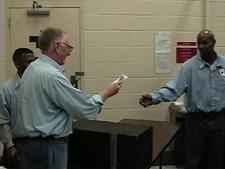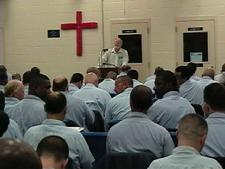In-Prison Ministry
In Prison Ministry is ministering within the confines of the various jails and prisons within the DOC (Department of Corrections). The focus is to see incarcerated men and women receive the opportunity to receive Jesus Christ as their Lord and Savior in a real and lasting way.
There are many things you need to know to become involved in the in-prison part of the prison ministry, and at least one thing you do not need to know. The one thing you do not need to know is what a man or woman did to become incarcerated. This type of question can be very embarrassing to an inmate and could cause him or her to not have contact with you or your ministry group. Even if they are willing to tell you the crime, you may not be prepared to hear about it, or it could prejudice you in your ability to work with them in the future. It is just best not to ask.
It is possible, however, after you earn their trust and have gotten to know each other, the inmate might desire to share their crime with you. If you have grown to love them in the Lord, it may not affect you as badly as it would have when you first met.
I believe it is always best for men or couples to minister in the all-male prisons and for women and couples to minister in the all-female prisons. When you do otherwise you are asking for trouble. You will always have more men coming to a Bible study when there are lots of ladies present. In the women’s correctional centers there will always be a good turnout for a Bible study with men in it. The interest is not always sexual; however, there will be some that come only for the prospect of talking to someone of the opposite sex. This, in itself, is not always bad. But we must keep in mind the reason for going into the prisons in the first place. Too many times singles of the opposite sex will disrupt the meeting more than it will help.
Your prison ministry experience could begin with the churches learning something about the local jail. Many times the men and women who are in jail may only have a short sentence. Ones who receive longer sentences will be sent to the state prison. Even if your church is not involved in the in-jail part of this ministry, when inmates get out you could be there for them by inviting them to your church. This could even be done through the group that is serving in the jail. Getting an ex-inmate involved in your church can help decrease the chance they would become incarcerated again. This also gives the family of this person a new chance, especially if they have children who may soon be following in the parent’s footsteps. This new change will give the children an opportunity to have a positive role model in their parent.
If you are not involved in actually going into the jail, you may desire to let the local jail chaplain know you would welcome those interested in going to a local church to come to your church. Always be careful of someone that may start coming to church for all the wrong reasons, like material needs. Helping them through the trouble they find themselves in, and other non-spiritual things, will prove to this man or woman that your church really cares. And, this can make a real difference in how they feel about taking a spiritual interest in the church.
Think of some things that got some of your regular members involved in church. Many people come to God for physical needs and receive the spiritual blessing as a bonus. Think of all the people healed by Jesus or fed by Jesus and remember: we do not know all the stories behind all of these events. Remember that these new converts will be like any new convert to the Lord. They will need nurturing and will be immature so they will need to be discipled. Just because these people may have been in trouble with the law, try not to have too many preconceived notions about them. Do not make them feel there are special rules for them because of their background. What do you know about the other members of your church? Better yet, what is it you do not know that might throw them into the same category with these ex-offenders?
Many times we have people who have not been incarcerated whom we do not know that come to our church and stay for all the physical need they can get and then they move on. It is up to the church to show these people the type of love that will give them the desire to keep coming back for the spiritual things and not move on. This does not mean, however, meeting every physical and material need they have. Remember the main purpose of their coming. Introduce them to Jesus and allow them to know Him as their Lord and Savior. Then if they do not stay at your church they will still be in great hands anyway. A church should not build their hopes up that they will convert every troubled person that comes to their church. The church might become discouraged when someone is not converted and seem to have used the church for personal or financial gain only. This might lead the church not want to help the next needy person that comes to them. It could give them such a letdown if someone that they have helped commits another crime or uses some of the church members to get material things and they really show no love for God.
God does not promise us that everything we do will be successful. Make the body of believers that are involved with this type of ministry aware of all the problems that might arise. Then go from there, knowing that something you never expected may come up. God is still God and He is aware of all that is going on, so keep all you do in prayer and what ever happens praise God even when it seems impossible.
Individuals coming out of prison need a home church. Allow the local jail to know you are interested in ministering to the families of inmates. If your church is not going into the local jail, allow any of the local groups who is going in to know you are interested in family ministry. Start your ministry to the family before the inmate comes home. Then he will feel more at home at your church when he gets out of prison. While you are ministering to the family the inmate is, hopefully, being ministered to in the prison. When the inmate comes home, the church already has a relationship with the family. Through correspondence with the inmate from some of the church members, they will even know something about the inmate. In this case the inmates will feel more comfortable in the church when they get home. If the church is not there for them when they first get home, this could lead him to problems. If the evil one has them get back with old so-called friends it could make the difference between going back to prison or serving the Lord. The time when they first get home will present the greatest time of temptation for the ex-inmate. They have been away from all the things we take for granted, and some things that we pray will no longer be of interest to them. If the church is there in a very supportive way for them it can really make the difference. This is also a way a church can work in part of the ministry without actually going into the prisons. This is why it is good to have different people who might desire to do separate parts of the ministry. Some may desire to go into the prisons; some may like to just write letters, and some may like the family part of the ministry. It all goes together and no part is less important than the other. If your church does decide to go into the prison as a group, or members of your church want to join a group going into a jail or prison, there is much more to learn than just what is on this tract. Rehoboth Jail & Prison Ministry will come to your church and give a free 4-hour seminar explaining all the outreaches in more detail when requested.

